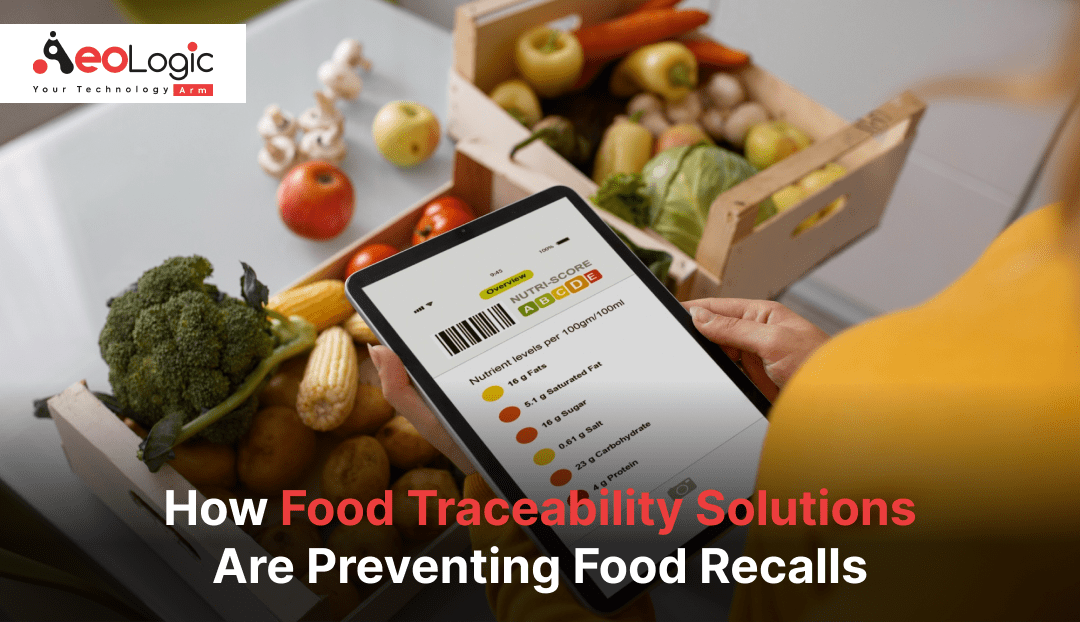Food safety is a critical concern, especially when it comes to preventing foodborne illnesses and ensuring the quality of food products. In the United States, the frequency of high-volume food recalls reveals the severity of food safety issues. These recalls can have dire consequences, including severe illnesses and even deaths. The primary challenge hindering effective food safety and sustainability is inadequate traceability.
This problem affects governments, companies, and consumers, making the need for robust food traceability solutions more pressing than ever. Companies are expected to be fully responsible for the safety of their products; however, they often struggle with limited visibility and control over their products once they leave the manufacturing facility. With supply chains becoming increasingly complex, ensuring complete traceability of products is essential for maintaining transparency and trust in the food industry.
Also read: Traceability Solutions for Food and Beverage Packaging Industry
The Role of Food Traceability Solutions in Food Safety
Serialization Technology:
Serialization technology is one of the most effective tools for enhancing traceability. By assigning unique identifiers to products, serialization allows for precise tracking of items through every stage of the supply chain. This technology provides valuable data that can be used to verify the origin and movement of products, ensuring that they are safe for consumption before they reach consumers. Serialization not only aids in monitoring the supply chain but also enhances the ability to conduct targeted recalls if a safety issue arises.
Legal Requirements:
Traceability is not just a best practice; it is also a legal requirement. In the U.S., the Food Safety Modernization Act (FSMA) of 2011 was a significant step forward in establishing traceability standards. FSMA aimed to enhance the safety of the U.S. food supply by shifting the focus from responding to contamination to preventing it. This legislation laid the groundwork for food traceability by requiring companies to implement systems that can trace the movement of food products through the supply chain.
Recently, the Food and Drug Administration (FDA) proposed new regulations under Section 204 of FSMA, which seek to impose stricter traceability requirements for businesses handling high-risk ingredients. These proposed rules are designed to improve the ability to quickly identify and address potential contamination issues, thereby reducing the risk of widespread foodborne illness outbreaks.
International Standards:
Traceability requirements are not limited to the U.S. In Europe, the European Commission’s General Food Law Regulation sets forth responsibilities for food and beverage organizations regarding traceability. This regulation mandates that businesses maintain detailed records of their products and their movements throughout the supply chain. Similarly, in the UK, the Food Standards Agency enforces traceability requirements through Article 18 of their General Food Law. These international standards underscore the global consensus on the importance of traceability in ensuring food safety.
The Importance of Comprehensive Traceability
Contamination Prevention:
Comprehensive traceability is crucial for preventing contamination and managing food safety incidents. Without detailed tracking, it is challenging to determine which materials have been exposed to potential contaminants. This lack of visibility makes it difficult to assess the risk of contamination or to identify the source of contamination if it is detected. Effective traceability systems provide the information needed to trace back through the supply chain to pinpoint where contamination may have occurred.
Allergen Management:
The need for thorough food traceability solutions is even more critical when dealing with allergen-containing ingredients. Undeclared allergens are a leading cause of food safety emergencies and recalls. For companies handling ingredients with allergen concerns, maintaining rigorous traceability is essential. This ensures that consumers with allergies can have confidence in the safety of the products they purchase. Traceability systems help monitor allergen exposure and prevent cross-contamination, thereby reducing the risk of allergen-related incidents.
Solutions for Food Recalls
Food traceability and recalls are crucial for ensuring food safety and quality. Here are some solutions to improve these processes:
Enhanced Tracking Systems
- Blockchain Technology: Implement blockchain to create a transparent, immutable ledger of the entire food supply chain. This can improve food traceability solutions and reduce the time needed to identify and address issues.
- RFID Tags and QR Codes: Use RFID (Radio-Frequency Identification) tags or QR codes on packaging to track products through each stage of the supply chain. Consumers can scan these RFID solutions to get information about the product’s origin and history.
Integrated Supply Chain Management
- Centralized Databases: Develop centralized databases that integrate information from all parties in the supply chain, including producers, processors, distributors, and retailers. This allows for quick access to critical information in the event of a recall.
- Automated Alerts: Set up automated alert systems that notify stakeholders immediately if a potential issue is detected, allowing for quicker response and recall actions.
Regular Audits and Inspections
- Routine Inspections: Conduct regular inspections and audits of facilities and supply chains to ensure compliance with safety standards and traceability requirements.
- Certification Programs: Implement third-party certification programs to verify that companies meet traceability and safety standards.
Data Analytics and Artificial Intelligence
- Predictive Analytics: Use data analytics to predict potential risks and identify patterns that could indicate a problem before it becomes widespread.
- AI-Based Monitoring: Deploy AI automation solutions to monitor and analyze data from across the supply chain for anomalies or signs of contamination.
Training and Education
- Stakeholder Training: Provide training for all stakeholders in the supply chain on best practices for traceability and recall procedures.
- Consumer Awareness: Educate consumers about how to check for recall information and the importance of food safety.
Effective Communication Channels
- Recall Notifications: Develop robust systems for notifying consumers and retailers about recalls quickly and clearly, including through social media, email, and direct notifications.
- Clear Labeling: Ensure that product labels are clear and include necessary information for tracking and recall purposes.
Also read: Ensuring Food Safety with Laser Coding: Best Practices and Regulations
Conclusion
Effective food traceability solutions are essential for preventing foodborne illnesses and managing recalls. Serialization technology, legal requirements, and international standards all contribute to enhancing traceability and ensuring the safety of food products. Comprehensive traceability systems not only help prevent contamination but also enable quick and effective recall management when issues arise.
By developing robust recall plans and setting high standards for efficiency, businesses can improve their response to food safety incidents and protect public health. As the food industry continues to evolve, maintaining a strong focus on food traceability solutions and recall preparedness will remain critical for safeguarding consumers and ensuring the integrity of the food supply chain.







